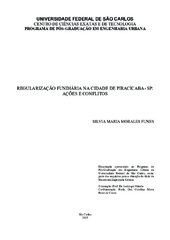| dc.contributor.author | Funes, Silvia Maria Morales | |
| dc.date.accessioned | 2016-06-02T20:01:01Z | |
| dc.date.available | 2005-07-07 | |
| dc.date.available | 2016-06-02T20:01:01Z | |
| dc.date.issued | 2005-04-06 | |
| dc.identifier.citation | FUNES, Silvia Maria Morales. Regularização fundiária na cidade de Piracicaba-SP:
Ações e conflitos.. 2005. 250 f. Dissertação (Mestrado em Ciências Exatas e da Terra) - Universidade Federal de São Carlos, São Carlos, 2005. | por |
| dc.identifier.uri | https://repositorio.ufscar.br/handle/ufscar/4394 | |
| dc.description.abstract | This work treats the issue of the land regularization of shantytowns, which,
analyzed as a wider subject, also includes urban and juridical interventions. This
research focused on the difficulties found in the development and conclusion of the
land regularization legal processes, specially the juridical matter, in other words,
the possession or property of the land, which the occupants demand so much. For
an empirical approach, we studied Piracicaba, a town in the state of São Paulo,
Brazil. On the subject of shantytowns, Piracicaba is different from most of the
average sized towns in the country, both in quantity and urban location. While most
of them have around 20% of their populations living in shanty towns, precarious
urban outline and lack of infra-structure, the population that lives in shanty towns in
Piracicaba is 5%, most of their nuclei present a reasonable urban outline and, at
least, they have access to basic infra-structure. The hypothesis that led the
research was that the legal processes of land regularization in shanty towns in
Piracicaba were not concluded because of the absence of an inhabitation public
policy, that included the land regularization, in which conditioning factors for the
formulation and implementation of the legal processes are essentially the
elaboration and materialization of the legislation, the existence of institutional
stability, the continuance of administrative actions when there is a change in the
government, financial viability, and the necessity of the participation of the
population. To verify the hypothesis, we have picked, as studies of cases, three
nuclei of shantytowns, among the fourty existent in Piracicaba, verifying the
evidences that occurred in each regularization legal process that intercepted their
conclusions. The period of analysis happens from the beginning of 1991 to the end
of 2004. The methodology included bibliographical revision of the literature and the
study of the legislation related to the subject, the documental analysis of the
empirical processes found in the municipal bodies, interviews, the elaboration of a
chart showing the evidences that happened in the three legal processes that were
studied, and the organization and analysis of the information obtained for the
hypothesis verification. At the end, we present the final considerations, showing
that the initial hypothesis was confirmed. | eng |
| dc.format | application/pdf | por |
| dc.language | por | por |
| dc.publisher | Universidade Federal de São Carlos | por |
| dc.rights | Acesso Aberto | por |
| dc.subject | Brasil - favelas | por |
| dc.subject | Regularização | por |
| dc.subject | Posse da terra | por |
| dc.subject | Função social da propriedade | por |
| dc.title | Regularização fundiária na cidade de Piracicaba-SP: ações e conflitos | por |
| dc.type | Dissertação | por |
| dc.contributor.advisor1 | Shimbo, Ioshiaqui | |
| dc.contributor.advisor1Lattes | http://genos.cnpq.br:12010/dwlattes/owa/prc_imp_cv_int?f_cod=K4783486E0 | por |
| dc.description.resumo | O tema tratado neste trabalho é a regularização fundiária de favelas entendida em
sentido amplo, que inclui as intervenções urbanas e jurídicas. Esta pesquisa
procurou focalizar as dificuldades encontradas no desenvolvimento e conclusão
dos processos de regularização fundiária, em especial na questão jurídica, ou seja,
em relação à posse ou propriedade, tão reivindicada por seus ocupantes. Para
análise empírica, estudamos o município de Piracicaba. Com relação ao problema
da favela, Piracicaba se mostra diferente da maioria das cidades de porte médio
do país, tanto em relação à quantidade como à sua situação urbana. Enquanto a
maioria delas apresenta uma população favelada em torno de 20%, além de um
desenho urbano precário e falta de infra-estrutura, Piracicaba tem uma população
favelada de apenas 5%; a maioria de seus núcleos apresentam um desenho
urbano razoável e são atendidas, no mínimo, por infra-estrutura básica. A hipótese
que norteou a pesquisa foi a de que os processos de regularização fundiária de
favelas em Piracicaba não se concluíram devido à falta de uma política pública de
habitação que incluísse a regularização fundiária, em que os fatores
condicionantes para formulação e implementação destes processos são,
principalmente, a elaboração e materialização das legislações, a existência de
estabilidade institucional, a continuidade de ações administrativas quando das
mudanças de governos, a viabilização de recursos, a necessidade de participação
da população. Para verificação da hipótese, destacamos como estudos de casos 3
núcleos de favelas entre os 40 existentes no município de Piracicaba, constatando
as evidências ocorridas em cada processo de regularização e que levaram à sua
não-conclusão. O período de análise é compreendido desde o início de 1991 até o
final de 2004. O método utilizado incluiu a revisão bibliográfica da literatura e o
estudo das legislações relativas ao tema, a análise documental dos processos
empíricos encontradas nos órgãos municipais, a realização de entrevistas, a
elaboração de um quadro mostrando as evidências ocorridas nos 3 processos
estudados e a organização e análise dos dados obtidos para a verificação da
hipótese. Por fim, apresentamos as considerações finais, evidenciando a
confirmação da hipótese inicial. | por |
| dc.publisher.country | BR | por |
| dc.publisher.initials | UFSCar | por |
| dc.publisher.program | Programa de Pós-Graduação em Engenharia Urbana - PPGEU | por |
| dc.subject.cnpq | CIENCIAS SOCIAIS APLICADAS::PLANEJAMENTO URBANO E REGIONAL | por |
